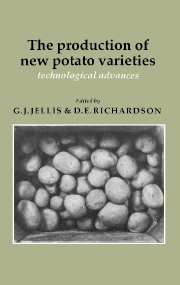Book contents
- Frontmatter
- Contents
- List of contributors
- Preface
- Editors' note and acknowledgements
- Introduction
- The development of potato varieties in Europe
- Genetic Resources
- Breeding Strategies
- Selection and Screening Methods
- Variety Assessment
- Potato variety assessment in the Federal Republic of Germany
- Potato variety assessment in France
- Variety assessment in The Netherlands
- Potato variety assessment in Poland
- Potato variety assessment in the UK
- Use of common origin seed for potato trials
- Micropropagation – an aid in the production of new varieties
- Testing potato varieties for response to drought and irrigation
- Testing varieties for resistance to and tolerance of Globodera pallida
- Testing for glycoalkaloids
- Methods for calculating 1–9 values to express the resistance of potato varieties to diseases
- Establishing standards in variety assessment
- Consumer quality requirements in the United Kingdom
- The effects of fertilizer treatments on a range of old and new early-maturing potato varieties
- Variety trials in Egypt, with special reference to dormancy
- Semi-conventional Breeding Methods
- True Potato Seed
- Unconventional Breeding Methods
- Commentary
- Index
Potato variety assessment in France
Published online by Cambridge University Press: 05 March 2012
- Frontmatter
- Contents
- List of contributors
- Preface
- Editors' note and acknowledgements
- Introduction
- The development of potato varieties in Europe
- Genetic Resources
- Breeding Strategies
- Selection and Screening Methods
- Variety Assessment
- Potato variety assessment in the Federal Republic of Germany
- Potato variety assessment in France
- Variety assessment in The Netherlands
- Potato variety assessment in Poland
- Potato variety assessment in the UK
- Use of common origin seed for potato trials
- Micropropagation – an aid in the production of new varieties
- Testing potato varieties for response to drought and irrigation
- Testing varieties for resistance to and tolerance of Globodera pallida
- Testing for glycoalkaloids
- Methods for calculating 1–9 values to express the resistance of potato varieties to diseases
- Establishing standards in variety assessment
- Consumer quality requirements in the United Kingdom
- The effects of fertilizer treatments on a range of old and new early-maturing potato varieties
- Variety trials in Egypt, with special reference to dormancy
- Semi-conventional Breeding Methods
- True Potato Seed
- Unconventional Breeding Methods
- Commentary
- Index
Summary
INTRODUCTION
In 1960 a “Catalogue of Cultivated Species and Varieties” was officially introduced and this provided a restricted list of varieties of certain species, the seed of which can be sold in France.
A variety is registered by the Ministry of Agriculture according to the advice of the “Comité Technique Permanent de la Sélection des Plantes Cultivées” (Permanent Technical Committee for Cultivated Plant Selection (CTPS)). This advice is based on the results of trials made by the “Groupement d'Etude et de Contrôle des Variétés et Semences” (Group for Study and Control of Varieties and Seeds (GEVES)) of INRA. Registration is for 10 years. It can be renewed for successive 5-year periods at the breeder's request and with the agreement of CTPS.
A breeder or his representative who wants a variety to be registered makes an application to CTPS. He has to pay registration fees for expenses for experimentation and has to provide seed equivalent in health status to basic seed, class E.
EXPERIMENTAL CONDITIONS
Official technical regulations include details of experimental procedures. The experimentation lasts at least 2 years. A variety can only be registered if it appears distinct from other varieties, stable and uniform after examination of its different characters. This examination is at present made by RIVRO, the Netherlands (see van der Woude, this volume), and was part of an agreement for cooperation between the two countries.
- Type
- Chapter
- Information
- The Production of New Potato VarietiesTechnological Advances, pp. 114 - 118Publisher: Cambridge University PressPrint publication year: 1987



